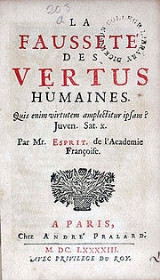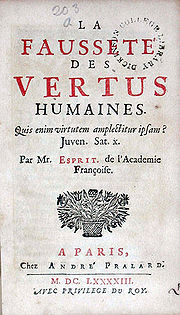
Jacques Esprit
Encyclopedia

Biography
Born at BéziersBéziers
Béziers is a town in Languedoc in southern France. It is a sub-prefecture of the Hérault department. Béziers hosts the famous Feria de Béziers, centred around bullfighting, every August. A million visitors are attracted to the five-day event...
, the son of a doctor from Toulouse
Toulouse
Toulouse is a city in the Haute-Garonne department in southwestern FranceIt lies on the banks of the River Garonne, 590 km away from Paris and half-way between the Atlantic Ocean and the Mediterranean Sea...
, he joined his brother (an Oratorian priest) in Paris, where Jacques studied theology and letters from 1628 to 1634. He attended the salon
Salon (gathering)
A salon is a gathering of people under the roof of an inspiring host, held partly to amuse one another and partly to refine taste and increase their knowledge of the participants through conversation. These gatherings often consciously followed Horace's definition of the aims of poetry, "either to...
of the marquise de Sablé
Madeleine de Souvré, marquise de Sablé
Madeleine de Souvré, marquise de Sablé , French writer, was the daughter of Gilles de Souvré, marquis de Courtenvaux, tutor of Louis XIII, and marshal of France....
and entered the service of the duchesse de Longueville then of the duc de La Rochefoucauld
François de La Rochefoucauld
François de La Rochefoucauld may be:* François de La Rochefoucauld , French author* François de La Rochefoucauld , French cardinal of the Catholic Church...
. Paul Pellisson
Paul Pellisson
thumb|Paul Pellisson,Paul Pellisson was a French author.He was born in Béziers, of a distinguished Calvinist family. He studied law at Toulouse, and practised at the bar of Castres. Going to Paris with letters of introduction to Valentin Conrart, a fellow Calvinist, he was introduced to the...
wrote: "He had a happy appearance, a delicacy of spirit, an amiable disposition, playful, and with much facility in speaking well and writing well". His talents were noticed by Pierre Séguier
Pierre Séguier
-Early years:Born in Paris, France of a prominent legal family originating in Quercy. His grandfather, Pierre Séguier , was président à mortier in the parlement of Paris from 1554 to 1576, and the chancellor's father, Jean Séguier, a seigneur d'Autry, was civil lieutenant of Paris at the time of...
, who rewarded him with a pension and made him a conseiller d'État
Conseiller d'État
A French Councillor of State is a high-level government official of administrative law in the Council of State of France.-Under the Old Regime:...
in 1636. He was elected a member of the Académie française
Académie française
L'Académie française , also called the French Academy, is the pre-eminent French learned body on matters pertaining to the French language. The Académie was officially established in 1635 by Cardinal Richelieu, the chief minister to King Louis XIII. Suppressed in 1793 during the French Revolution,...
in 1639.
Falling into disgrace with Séguier in 1644, he took refuge in the Oratorian seminary. The prince de Conti visited and befriended him, lodging him in his hôtel and giving him 15,000 livres with which to get married. When the prince was made governor of the Languedoc
Languedoc
Languedoc is a former province of France, now continued in the modern-day régions of Languedoc-Roussillon and Midi-Pyrénées in the south of France, and whose capital city was Toulouse, now in Midi-Pyrénées. It had an area of approximately 42,700 km² .-Geographical Extent:The traditional...
in 1660, Jacques Esprit accompanied him and served him as intendant. On his benefactor's death in 1666, he returned to live in his birthplace of Béziers, where he educated his three daughters and edited a single work, La Fausseté des vertus humaines, and it was there that he died.
La Fausseté des vertus humaines
La Fausseté des vertus humaines went through many editions and was translated into English in London in 1706 as Discourses on the Deceitfulness of Humane Virtues.List of works
- La Fausseté des vertus humaines (2 volumes, 1678 ; 1693 ; 1709). Online text. Reissue: Pascal QuignardPascal QuignardPascal Quignard is a French writer born in Verneuil-sur-Avre, Eure. In 2002 his novel Les Ombres errantes won the Prix Goncourt, France's top literary prize. Terrasse à Rome , received the French Academy prize in 2000...
, La Fausseté des vertus humaines, précédée de Traité sur Esprit, Aubier, Paris, 1996. - L'Art de connoistre les hommes (1702). Édition abrégée de La Fausseté des vertus humaines.

